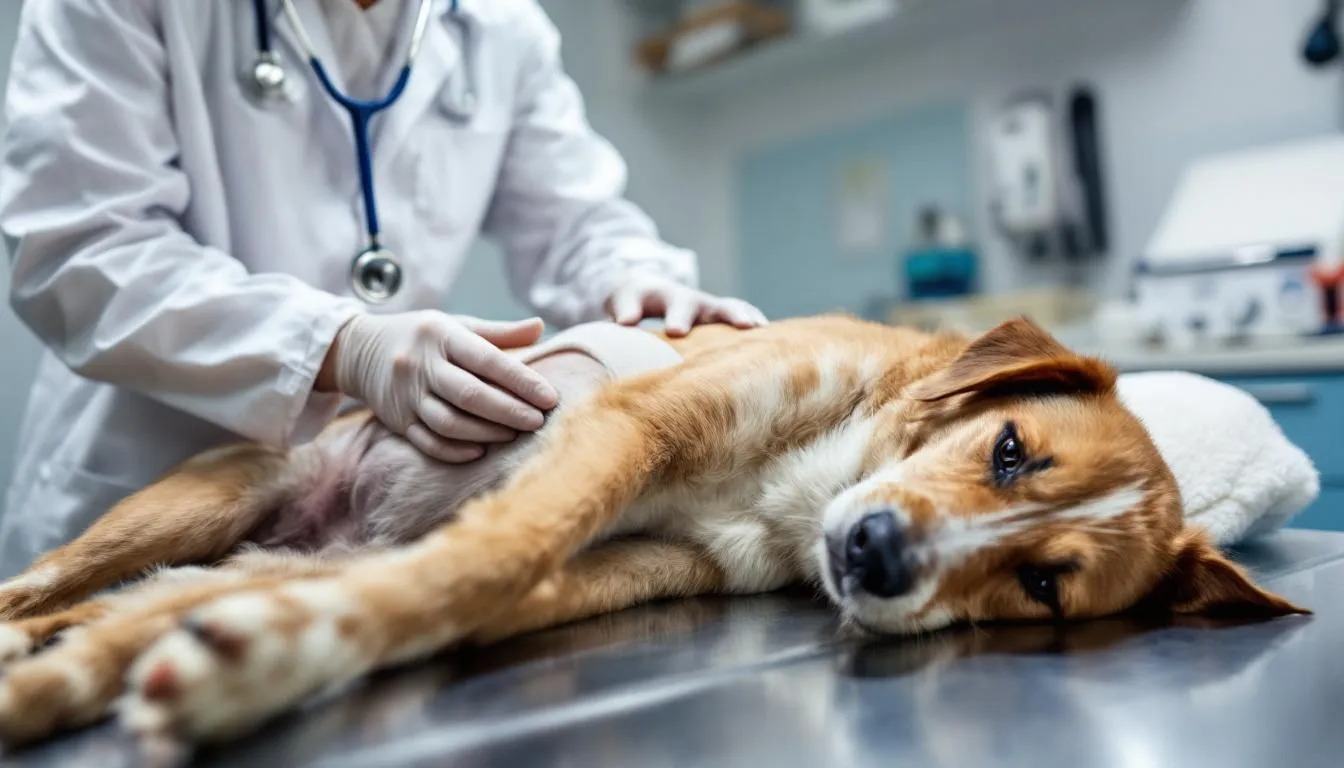Key Takeaways
- Dog constipation is defined as difficulty passing normal stool for 48+ hours and can become life-threatening if untreated
- Common symptoms include straining, hard dry stools, abdominal pain, and absence of bowel movements for 2+ days
- Immediate veterinary attention is required for persistent constipation to prevent serious complications like obstipation
- Home remedies like increased water intake and exercise may help mild constipation, but should never replace professional veterinary care
- Senior dogs and males are more susceptible to constipation due to age-related factors and enlarged prostate issues
Dog constipation is defined as difficulty passing normal stool for 48+ hours and can become life-threatening if untreated
Common symptoms include straining, hard dry stools, abdominal pain, and absence of bowel movements for 2+ days
Immediate veterinary attention is required for persistent constipation to prevent serious complications like obstipation
Home remedies like increased water intake and exercise may help mild constipation, but should never replace professional veterinary care
Senior dogs and males are more susceptible to constipation due to age-related factors and enlarged prostate issues
Your dog hasn’t had a bowel movement in two days, and you’re starting to worry. Is this normal? When should you be concerned? Dog constipation affects dogs of all ages but becomes increasingly common in senior pets. Understanding the difference between occasional irregularity and serious digestive issues can help you respond appropriately and keep your dog comfortable.
Most dogs maintain regular bowel movements once or twice daily. When this pattern changes significantly, especially when your constipated dog shows signs of distress, it’s time to take action. Let’s explore everything you need to know about recognizing, treating, and preventing constipation in dogs.


What Is Dog Constipation
Normal bowel movement frequency in healthy dogs typically occurs once or twice daily, though some dogs may defecate up to three times per day depending on their dog’s diet, age, and activity level. A dog's diet plays a crucial role in digestive health and can influence the risk of constipation, as dietary fiber, wet food, and supplements like pumpkin or probiotics help maintain a healthy digestive system. A constipated dog experiences infrequent, incomplete, or difficult passage of stool, leading to the accumulation of dry, hard feces in the digestive tract.
Constipation differs significantly from temporary reluctance to defecate in new environments. Many dogs hesitate to have bowel movements when traveling, staying in unfamiliar places, or when their routine changes. Sudden changes in a dog's food can also contribute to constipation. This behavioral response usually resolves within 24 hours once the dog adjusts to their surroundings.
Chronic constipation represents a more serious condition than occasional episodes. While occasional constipation might resolve with simple dietary adjustments or increased water intake, chronic constipation often indicates underlying medical issues requiring veterinary intervention. The dog's intestinal tract can become permanently damaged if chronic constipation progresses to obstipation.
Obstipation occurs when complete blockage develops with hard, compacted feces that cannot be passed naturally. This represents the most severe form of constipation and constitutes a medical emergency. Pet parents should understand that obstipation can lead to irreversible medical condition affecting the enlarged colon permanently. In constipated dogs, the dog's stool is often hard, dry, and difficult to pass, which are key signs to watch for.


Signs and Dog Constipation Symptoms
The primary dog constipation symptoms include absence of bowel movements for 48 hours or longer, combined with visible straining without producing stool. When a dog is constipated, they may squat frequently but produce no results, or only pass small amounts of mucus.
Physical signs become apparent in the dog’s stool quality when bowel movements do occur. Instead of normal, well-formed stools, constipated dogs produce hard, dry, pebble-like droppings. Some dogs may pass mucus instead of normal fecal matter, which many pet parents mistake for diarrhea.
Behavioral indicators provide important clues about your dog’s condition. A constipated dog often circles excessively before attempting to defecate, showing restlessness and discomfort. They may squat frequently throughout walks without producing results, or demonstrate reluctance when you touch their dog’s abdomen.
Pain signals require immediate attention and are also considered signs of serious complications. Dogs experiencing abdominal pain may vocalize when touched, growl during examination, or show visible tension in their dog’s abdomen. Difficulty or pain when passing feces is a sign that may indicate a more serious health issue, such as a bowel obstruction, and requires urgent veterinary attention. A painful abdomen feels firm or distended compared to normal, and dogs may resist handling in this area.
Secondary symptoms often develop as constipation progresses. Loss of appetite, lethargy, vomiting, and general restlessness indicate that the digestive system dysfunction is affecting overall health. These signs suggest the need for immediate veterinary evaluation.
Common Causes of Constipation in Dogs
Dietary factors represent the most common trigger for constipation in dogs. Insufficient dietary fiber in the dog’s food, chronic dehydration, or sudden changes to your dog’s diet can disrupt normal digestive function. Foreign object ingestion, particularly non-food items like toys, bones, or debris, can create physical blockages preventing normal bowel movements.
Physical causes often involve lifestyle factors affecting the intestinal tract. Lack of exercise reduces natural stimulation of bowel function, while obesity can complicate normal defecation postures. Social interaction and play with other dogs can help promote physical activity and support digestive health, potentially reducing the risk of constipation. Problems with anal glands, tumors, or an enlarged prostate gland in older male dogs can physically obstruct the passage of feces.
Medical conditions frequently contribute to dogs constipation. Kidney disease, electrolyte imbalances, neurological disorders affecting nerve function, and medication side effects can all slow digestive tract function. Some medications, particularly pain relievers and certain antibiotics, are known to cause constipation as a side effect.
Age-related factors make senior dogs particularly vulnerable to digestive issues. Slower digestive function, reduced mobility affecting exercise levels, and the development of underlying diseases all contribute to increased constipation risk in older pets. The combination of decreased activity and potential medication use creates a perfect storm for digestive problems.
Environmental stressors shouldn’t be overlooked when evaluating potential causes. Travel, new surroundings, changes in routine, or anxiety can significantly affect your dog’s digestive system. Some dogs develop constipation purely from stress-related changes in their environment or daily schedule.


When to Contact Your Veterinarian
Emergency situations require immediate veterinary attention and should never be managed with home remedies alone. If your dog shows no bowel movement for 48 hours or longer, contact your veterinarian immediately. Severe straining with absolutely no results, especially when accompanied by distress, indicates a potential emergency.
Red flag symptoms demand urgent professional evaluation. Vomiting combined with constipation, complete loss of appetite lasting more than 24 hours, or visible abdominal distension suggest serious complications. These signs may indicate bowel obstruction or other life threatening conditions requiring immediate intervention.
Signs of bowel obstruction constitute veterinary emergencies. Complete inability to pass any stool, extreme pain when touching the abdomen, continuous retching, or rapid deterioration in your dog’s condition all require emergency care. Bowel obstruction can become life threatening within hours if left untreated.
Chronic cases need professional management even when not immediately life threatening. If your dog experiences recurring constipation episodes, develops a pattern of irregular bowel movements, or requires frequent intervention to maintain normal function, veterinary evaluation becomes essential for long-term health.
When contacting your veterinarian, provide specific information about the timeline of symptoms, any recent changes to your dog’s food, medications given, and whether your dog has consumed any non-food items. This medical history helps veterinarians assess urgency and plan appropriate treatment approaches.
Safe Home Remedies for Mild Constipation
Hydration methods form the foundation of safe home management for mild constipation. Ensure constant access to fresh water, and consider adding low-sodium bone broth to encourage increased fluid intake. Switching temporarily from dry kibble to canned food increases moisture content in your dog’s diet naturally.
Dietary additions can provide gentle relief when used appropriately. One to two tablespoons of 100% pure canned pumpkin (never pumpkin pie filling) added to regular meals provides natural dietary fiber that can soften stool. Small amounts of coconut oil, approximately one teaspoon per 20 pounds of body weight, may also help with stool passage.
Exercise recommendations focus on gentle stimulation of digestive function. Increased walks, even short ones, help stimulate natural bowel movement reflexes. Avoid exercise excessive in intensity, as this can worsen dehydration. Instead, aim for more frequent, moderate activity sessions throughout the day.
Fiber adjustments require careful consideration and gradual implementation. Small amounts of wheat bran or other appropriate fiber sources can help, but avoid sudden increases that might worsen the problem. Too much fiber can actually absorb water from the digestive tract, potentially making constipation worse.
Important warnings cannot be overstated: never use human laxatives, perform home enemas, or administer any over-the-counter medications without veterinary approval. Products like cow milk medication intended for humans can cause severe electrolyte imbalances and intestinal damage in dogs. Home remedies should complement, never replace, professional veterinary care when constipation persists beyond 48 hours.
Professional Veterinary Treatment Options
Diagnostic procedures begin with comprehensive physical examination and medical history review. Your veterinarian will perform a rectal examination to assess for physical obstructions, masses, or impacted fecal material. Blood tests help identify underlying metabolic conditions, dehydration, or electrolyte imbalances contributing to the problem.
Advanced diagnostic tools may include abdominal X-rays to visualize the intestinal tract and identify foreign objects or fecal masses. These imaging studies help distinguish between simple constipation and more serious conditions requiring surgical intervention.
Medical treatments typically start with prescription stool softeners and medications specifically formulated for dogs. Lactulose, cisapride, and other prescription medications work differently than over-the-counter products and are much safer for canine use. IV fluids address dehydration and help restore normal electrolyte balance.
Advanced interventions become necessary for severe cases. Veterinary-supervised enemas use appropriate solutions and techniques to avoid complications. Manual removal of impacted feces requires sedation and professional expertise to prevent injury to the dog’s intestinal tract.
Surgical options may be required when foreign objects cause obstruction or when underlying conditions like tumors need treatment. Surgical treatment carries risks but becomes necessary when conservative management fails or when life threatening complications develop.
Follow-up care focuses on preventing recurrence through dietary adjustments, exercise recommendations, and long-term monitoring. Your veterinarian may recommend prescription diet high in appropriate fiber, regular recheck appointments, or ongoing medication to maintain healthy digestion.
Complications of Untreated Constipation
Obstipation development represents the most immediate serious complication of untreated severe constipation. This condition involves complete blockage with hardened, immovable fecal matter that cannot be passed through normal bowel function. Once obstipation develops, the fecal mass becomes so hard and large that natural passage becomes impossible.
Megacolon condition can develop from chronic, untreated constipation. This irreversible medical condition involves permanent distension of the enlarged colon, which loses its ability to contract normally. Dogs with megacolon require lifelong management and may need surgical treatment to maintain any quality of life.
Systemic effects of prolonged constipation extend far beyond the digestive system. Toxin buildup occurs when waste products cannot be eliminated normally, leading to potentially vomiting and systemic illness. Severe dehydration and electrolyte imbalances can affect heart function, kidney function, and overall metabolic processes.
Life threatening scenarios can develop rapidly in severe cases. Bowel perforation, though rare, can occur when pressure from impacted feces becomes too great. This leads to sepsis, organ failure, and requires emergency surgical intervention with guarded prognosis for recovery.
Long-term consequences affect quality of life even after successful treatment. Dogs who experience severe constipation episodes may develop chronic digestive issues, requiring permanent dietary management and ongoing veterinary monitoring. Prevention becomes crucial for maintaining long-term health and comfort.


Prevention Strategies
Dietary management forms the cornerstone of constipation prevention. Feed a balanced diet appropriate for your dog’s age, size, and activity level, maintaining consistent feeding schedules. Include appropriate levels of dietary fiber through high-quality canned dog food or prescription diet formulations designed for digestive health.
Hydration maintenance requires multiple approaches beyond simply providing water bowls. Consider adding water to dry kibble, offering ice cubes as treats, or flavoring water with small amounts of low-sodium broth to encourage consumption. Monitor intake, especially during hot weather or periods of increased activity.
Regular exercise routines benefit digestive function significantly. Most dogs need daily walks and activity appropriate for their age and physical condition. Even senior dogs benefit from gentle, consistent movement that stimulates natural digestive processes without causing excessive strain.
Health monitoring through regular veterinary checkups enables early detection of underlying conditions that might contribute to constipation. Discuss any changes in your dog’s bowel movements, appetite, or behavior during routine visits. Early intervention prevents minor issues from becoming serious problems.
Environmental considerations include maintaining clean, comfortable elimination areas and consistent bathroom routines. Reduce stress through predictable schedules, appropriate socialization, and environmental enrichment. Address anxiety or behavioral issues that might affect normal elimination patterns.
The Role of Canned Food in Dog Constipation
Canned dog food can play a significant role in helping a constipated dog find relief and maintain regular bowel movements. Many pet parents notice that when they switch to canned dog food or add it to their dog’s diet, their dog’s stool becomes softer and easier to pass. This is because canned food contains a much higher moisture content than dry kibble, which helps hydrate the digestive tract and soften dry stools or hard fecal mass that can be painful for dogs to pass.
In addition to its hydrating benefits, canned dog food often contains more dietary fiber than some dry foods. Dietary fiber is essential for healthy digestion and helps keep food moving smoothly through the digestive tract. For dogs experiencing constipation, especially chronic constipation, a diet that includes the right amount of fiber can make a big difference in the frequency and comfort of their bowel movements. Some canned foods are even formulated with natural fiber stool softeners, such as pumpkin, to further support regularity.
When considering dietary management for constipation in dogs, it’s important for pet parents to introduce new foods, including canned food, gradually. Sudden changes or the wrong combination of dog food and supplements can upset the digestive system and potentially worsen constipation symptoms. Always look for canned dog food made with wholesome ingredients and avoid products with fillers or by-products, which can be harder for dogs to digest and may contribute to the buildup of fecal matter.
For dogs with more severe or chronic constipation, veterinarians may recommend a prescription diet that includes canned food specifically designed to promote healthy digestion and regular bowel movements. These diets are carefully balanced to provide the right levels of moisture and fiber, helping to prevent the formation of hard fecal mass and supporting the overall health of the digestive tract. In some cases, if dietary changes alone are not enough, more intensive treatments such as manual removal of fecal matter or even surgical treatment may be necessary.
No matter what type of food you choose, always ensure your dog has access to fresh water at all times, as dehydration can quickly worsen constipation. By working closely with your veterinarian and making thoughtful choices about your dog’s diet, many pet parents can help their constipated dog pass feces more comfortably and reduce the risk of future episodes of constipation. Canned dog food, when used as part of a comprehensive dietary management plan, can be a valuable tool in supporting your dog’s digestive health and overall well-being.
Special Considerations for Senior Dogs
Age-related risk factors make older dogs particularly susceptible to constipation. Decreased mobility, slower metabolism, and increased likelihood of underlying medical conditions all contribute to digestive issues. Additionally, many older male dogs develop enlarged prostate glands that can physically interfere with normal defecation.
Modified exercise routines accommodate the needs of senior pets while maintaining digestive health. Focus on gentle, consistent activity rather than intense exercise sessions. Short, frequent walks often work better than long hikes, and swimming provides excellent low-impact exercise for dogs with joint issues.
Dietary adjustments for senior dogs often include easier-to-digest formulations and increased moisture content. Senior-specific dog foods typically contain appropriate fiber levels and nutrients that support aging digestive systems. Consider prescription diets designed specifically for senior digestive health.
Increased monitoring becomes essential for early detection of problems in older dogs. Watch for changes in elimination patterns, appetite, or energy levels that might indicate developing issues. Senior dogs benefit from more frequent veterinary checkups to catch problems before they become serious.
Comfort measures help senior dogs maintain normal elimination patterns despite physical limitations. Orthopedic bedding, ramps or steps to reduce jumping, and stress reduction techniques all contribute to overall comfort and digestive health in aging pets.
FAQ
How long can a dog safely go without pooping before it becomes dangerous?
Most dogs should have normal bowel movements daily, but up to 48 hours may be acceptable depending on the individual dog’s normal pattern. However, beyond 48-72 hours requires immediate veterinary attention, as this timeframe significantly increases the risk of complications like obstipation or systemic toxicity.
Can I give my dog mineral oil or human laxatives for constipation?
Never give human medications to dogs without veterinary approval. Human laxatives, mineral oil, and over-the-counter stool softeners can cause serious harm including severe electrolyte imbalances, intestinal damage, and aspiration pneumonia. Dogs require species-specific medications administered under professional supervision.
What’s the difference between a high fiber diet and a low-residue diet for constipated dogs?
A high fiber diet adds bulk and can sometimes worsen constipation by absorbing water in the colon, while a low-residue diet produces less waste and may be easier to digest. The choice depends on the underlying cause - some dogs benefit from increased fiber while others need easily digestible, low-residue nutrition during recovery.
How can I tell if my dog has a bowel obstruction versus simple constipation?
Bowel obstruction typically involves complete inability to pass any stool, severe continuous pain, projectile vomiting, and rapid deterioration in condition. Simple constipation may still allow some stool passage, responds to basic interventions like increased water or gentle exercise, and doesn’t usually cause severe systemic symptoms.
Are certain dog breeds more prone to constipation than others?
While any dog can become constipated, certain factors increase risk. Older dogs, particularly unneutered males with enlarged prostates, face higher risk. Breeds prone to hip dysplasia or mobility issues may have difficulty maintaining proper posture for defecation. Additionally, long-haired breeds may experience problems with matted hair surrounding the anal area, potentially obstructing normal elimination.
FAQ
How long can a dog safely go without pooping before it becomes dangerous?
Most dogs should have normal bowel movements daily, but up to 48 hours may be acceptable depending on the individual dog’s normal pattern. However, beyond 48-72 hours requires immediate veterinary attention, as this timeframe significantly increases the risk of complications like obstipation or systemic toxicity.
Can I give my dog mineral oil or human laxatives for constipation?
Never give human medications to dogs without veterinary approval. Human laxatives, mineral oil, and over-the-counter stool softeners can cause serious harm including severe electrolyte imbalances, intestinal damage, and aspiration pneumonia. Dogs require species-specific medications administered under professional supervision.
What’s the difference between a high fiber diet and a low-residue diet for constipated dogs?
A high fiber diet adds bulk and can sometimes worsen constipation by absorbing water in the colon, while a low-residue diet produces less waste and may be easier to digest. The choice depends on the underlying cause - some dogs benefit from increased fiber while others need easily digestible, low-residue nutrition during recovery.
How can I tell if my dog has a bowel obstruction versus simple constipation?
Bowel obstruction typically involves complete inability to pass any stool, severe continuous pain, projectile vomiting, and rapid deterioration in condition. Simple constipation may still allow some stool passage, responds to basic interventions like increased water or gentle exercise, and doesn’t usually cause severe systemic symptoms.
Are certain dog breeds more prone to constipation than others?
While any dog can become constipated, certain factors increase risk. Older dogs, particularly unneutered males with enlarged prostates, face higher risk. Breeds prone to hip dysplasia or mobility issues may have difficulty maintaining proper posture for defecation. Additionally, long-haired breeds may experience problems with matted hair surrounding the anal area, potentially obstructing normal elimination.






